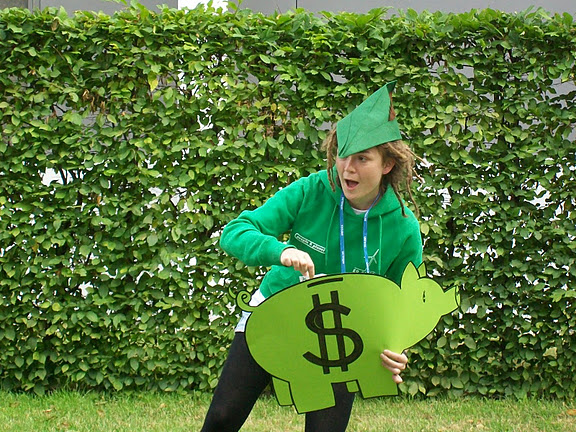
What would Robin Hood say?
By Asad Rehman, Friends of the Earth England, Wales and Northern Ireland
June 15, 2011
Dressed as the British folklore hero Robin Hood, youth climate activists were collaring passing government delegates on their way in to the Maritim Hotel, site of the climate talks in Bonn. As fun as it is to dress up, there was another motive behind the stunt: to promote the “Robin Hood Tax,” also known as the financial transaction tax. The campaign — which Friends of the Earth is part of, and which has gathered momentum throughout Europe and beyond — tries to invoke its popular namesake, who “steals from the rich to give to the poor.”
As Wall Street profits remain sky high and fat cat bonuses are doled out on silver spoons, the world’s poor are struggling to deal with a climate crisis that they did not cause, facing increasingly severe droughts, floods, crop losses and water shortages. A financial transaction tax levied on all financial market transactions involving stocks, bonds, foreign exchange and derivatives could raise hundreds of billions per year, helping to fund the just transition to low-carbon economies in developing countries while also supporting public services at home. A financial transaction tax would also help curb speculation, tamping down on Wall Street profiteers who fuel instability in financial markets to the detriment of society.
Talking to a lunchtime press conference on the issue, Bob Baugh, from the International Trade Union Congress, said, “The tax is tiny but the annual revenues would be a great leap forward.”
Current pledges of climate finance by developed countries ($30 billion until 2012 and an aim of mobilizing $100 billion a year by 2020) come nowhere near the sums needed to address climate change in developing countries. Moreover, most of the money that’s been mobilized so far is in fact recycled overseas development aid (ODA). According to Tetteh Hormeku from the Africa Trade Network, “You cannot avoid the impression that it’s repackaged aid — none of the fast start finance [between 2010 and 2012] is new!”
And to add salt to the wound, the U.S., Japan and Canada are trying to go back on the promised $100 billion in long term financing. They’re currently proposing a financial “pledge” system whereby each country decides how much it can mobilize, regardless of the total figure reached. The same countries are also refusing to talk about where the money is coming from.
Baugh made it clear: “Finance is the central question on the road to [the next climate conference in] Durban — everyone wants it, but no one wants to talk about how to pay for it. It’s time for the financial community to step up.”
A financial transaction tax is only one of many options on the table to help plug a gap in much needed financing from developed countries. Other options include the transfer of IMF-created “special drawing rights” (reserve assets created by the International Monetary Fund that countries can exchange for hard currency) from rich to poorer countries, redirecting harmful fossil-fuel subsidies, reducing spending on ballooning military budgets, and taxing aviation and shipping. And in no way is this list exhaustive.
Unfortunately, the priorities held by our politicians and the current global economic system lie elsewhere. Instead of saving the planet, they’re spending hundreds of billions bailing out the banks. It’s worrying that even though there are potential solutions in front of us — and many countries are expressing a willingness to discuss them here in Bonn — we’re just not getting there. Outside the UNFCCC, members of the G20 have stated their support for the financial transaction tax (especially the current G20 president, Nicolas Sarkozy).
We as the public cannot allow our governments to ignore these innovative means of finance if we are ever to reach the sums necessary to deal with the impacts of climate change and to ensure poorer countries are able to develop cleanly. If Robin Hood and his merry men were here today, they would surely be as appalled with the unequal distribution of wealth as today’s young activists acting in their name.
Related Posts
Ways to Support Our Work

Read Latest News
Stay informed and inspired. Read our latest press releases to see how we’re making a difference for the planet.

See Our Impact
See the real wins your support made possible. Read about the campaign wins we’ve fought for and won together.

Donate Today
Help power change. It takes support from environmental champions like you to build a more healthy and just world.